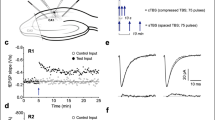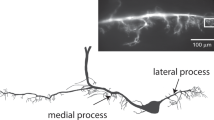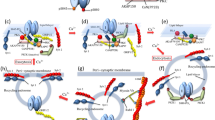Abstract
Long-term potentiation (LTP) in the hippocampus is an interesting example of synaptic plasticity because of its induction by physiological discharge rates and its long duration1,2. Of the possible biochemical mechanisms that regulate prolonged changes in cell function, protein phosphorylation is a particularly attractive candidate3. We have therefore examined the effect of intracellular injection of calcium/diacylglycerol-dependent protein kinase (protein kinase C (PKC)) in CA1 pyramidal neurones in hippocampal slices. Injection of the active enzyme elicited long-lasting enhancement of synaptic transmission, similar to LTP, whereas inactivated kinase failed to do so. The observed changes included an increased amplitude of the excitatory post-synaptic potential (e.p.s.p.) and an increased probability of firing and a reduced latency of the associated actin potential.
This is a preview of subscription content, access via your institution
Access options
Subscribe to this journal
Receive 51 print issues and online access
$199.00 per year
only $3.90 per issue
Buy this article
- Purchase on Springer Link
- Instant access to full article PDF
Prices may be subject to local taxes which are calculated during checkout
Similar content being viewed by others
Author information
Authors and Affiliations
Rights and permissions
About this article
Cite this article
Hu, GY., Hvalby, Ø., Walaas, S. et al. Protein kinase C injection into hippocampal pyramidal cells elicits features of long term potentiation. Nature 328, 426–429 (1987). https://doi.org/10.1038/328426a0
Received:
Accepted:
Issue Date:
DOI: https://doi.org/10.1038/328426a0
This article is cited by
-
Maternal gastrointestinal nematode infection alters hippocampal neuroimmunity, promotes synaptic plasticity, and improves resistance to direct infection in offspring
Scientific Reports (2024)
-
Rac1 is a downstream effector of PKCα in structural synaptic plasticity
Scientific Reports (2020)
-
PKCα integrates spatiotemporally distinct Ca2+ and autocrine BDNF signaling to facilitate synaptic plasticity
Nature Neuroscience (2018)
-
Synaptic Therapy in Alzheimer's Disease: A CREB-centric Approach
Neurotherapeutics (2015)
-
A3 adenosine receptor antagonists delay irreversible synaptic failure caused by oxygen and glucose deprivation in the rat CA1 hippocampus in vitro
British Journal of Pharmacology (2006)
Comments
By submitting a comment you agree to abide by our Terms and Community Guidelines. If you find something abusive or that does not comply with our terms or guidelines please flag it as inappropriate.



